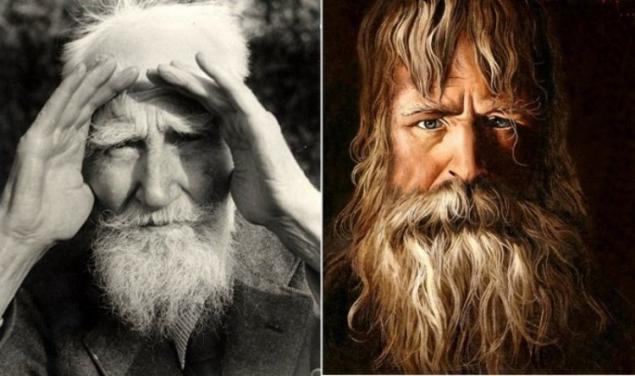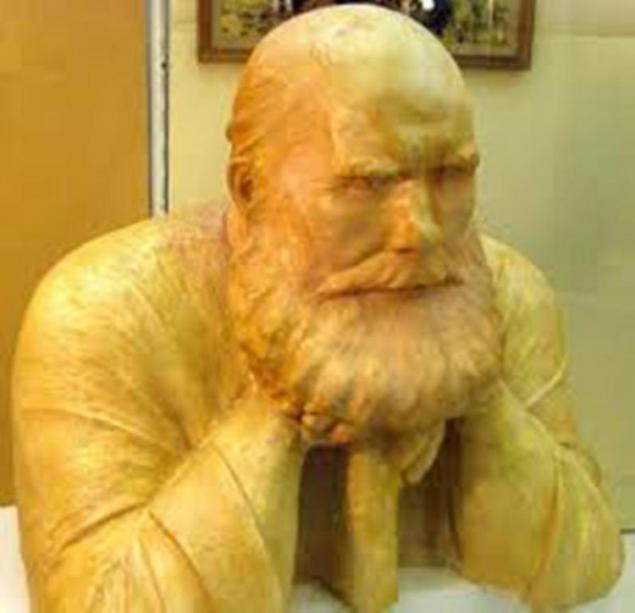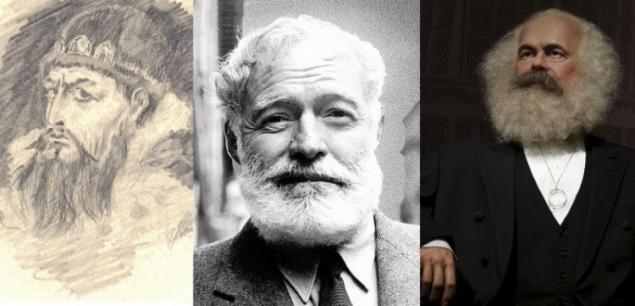1754
5 Reasons Why Russian man should be bearded
Russian philosophers called beard fundamental virtue of the Orthodox Russian people. On the "husbands bradolyubivyh" composed religious poems and odes and shaver in pre-Petrine era equated to the knife that was used for the operation of turning a man into a eunuch. So why are Russian man should wear a beard?

1. Beard as a pass to paradise.
In the last decades of the 17th century Patriarch Adrian wrote: "God created man with a beard, and only dogs with cats beardless." All who "scrape" excommunicated. All this was done because according to the Scriptures man who professes the faith of Christ, by his appearance should resemble the image of Christ. And precisely because it was believed that men gladkovybrityh not allow the kingdom of heaven.

2. Beard for a show of force.
In those days in Russia met any man beard, bushy and on its density. It was believed that the thicker vegetation at the man on the face, the better "breed" of the man and his more masculine strength. Those who on the face was a rare "vegetation" were considered degenerates. And all beardless almost always were single.
To preserve their dignity. It was believed that the honor of the Ruthenians - is his beard. Therefore beard inflicted damage is automatically recognized as a serious crime against the person. Penalty for out-of beard hair was set in the period of the reign of Yaroslav the Wise. The originator of this one torn tuft payable in favor of the state treasury 12 hryvnia. In the days of Ivan the Terrible practiced civil penalty guilty boyars - he plucked his beard. To wash away the shame, it was necessary either to perform the feat, or go into a monastery.

3. Beard as a gift of God.
Beard in Russia was equal to the gift of God. In this sense, the Russian people was quite gifted. In other words, the beard has become a national treasure that protects even the unofficial ban on marriages with foreigners. In particular, this applies to those whom nature has deprived thick hair. Very easy to learn and those who sinned with "infidels" - their descendants, to be exact - in their rare "goat" beard. Such people surnamed "bastards" (derived from "fornication"). A clear this status and be a full member of the surrounding society was not possible.

4. Beard for harmony in the life of this world.
Beard for the Russian people was a kind of rocker in a complex world. For example, stroking his beard to hide the excitement, take a pause in the conversation, or to attract the attention of the interlocutor. Loss of beard or her often considered a bad sign. It lost hair or accidentally torn shreds was very serious attitude, "bald" her husband had to go to confession and fasting, and, quite strict. Those who voluntarily shaved his beard, always considered an obsession. Perhaps the most frightening for the Russian people has always been a royal "scraping».

5. Beard - a symbol of independence.
But from the 19th century beard is a sign of dissent. Only beards worn by merchants, Old Believers and priests all so do not raise any problems. In the early period of the Soviets, the beard was the hallmark of a wealthy farmer, academician or a priest, and later admirers informal Vysotsky or eccentric Hemingway. You could say that having a beard is a testament to the independence views, and even revolutionary man. Confirmation of this - the bearded leaders of many of the world revolution.
Beards and popular today. A striking example - hipsters movement that emerged in the US in the late 40's - early 50-ies. And if the recently popular with women used clean-shaven men, now on the crest of male attractiveness - bearded, especially if the beard is such an individual has a unique styling and exclusive style. Against the background of "smooth" the representatives of the male population, bearded hipsters look courageous, and just brutal. However, this does not exclude the fact that the hipster beard should be well groomed. Modern hipsters consider themselves the engine of modern art. However, today, when to wear a beard became mainstream, neohipstery increasingly losing touch with their forerunners of the mid XX century.


1. Beard as a pass to paradise.
In the last decades of the 17th century Patriarch Adrian wrote: "God created man with a beard, and only dogs with cats beardless." All who "scrape" excommunicated. All this was done because according to the Scriptures man who professes the faith of Christ, by his appearance should resemble the image of Christ. And precisely because it was believed that men gladkovybrityh not allow the kingdom of heaven.

2. Beard for a show of force.
In those days in Russia met any man beard, bushy and on its density. It was believed that the thicker vegetation at the man on the face, the better "breed" of the man and his more masculine strength. Those who on the face was a rare "vegetation" were considered degenerates. And all beardless almost always were single.
To preserve their dignity. It was believed that the honor of the Ruthenians - is his beard. Therefore beard inflicted damage is automatically recognized as a serious crime against the person. Penalty for out-of beard hair was set in the period of the reign of Yaroslav the Wise. The originator of this one torn tuft payable in favor of the state treasury 12 hryvnia. In the days of Ivan the Terrible practiced civil penalty guilty boyars - he plucked his beard. To wash away the shame, it was necessary either to perform the feat, or go into a monastery.

3. Beard as a gift of God.
Beard in Russia was equal to the gift of God. In this sense, the Russian people was quite gifted. In other words, the beard has become a national treasure that protects even the unofficial ban on marriages with foreigners. In particular, this applies to those whom nature has deprived thick hair. Very easy to learn and those who sinned with "infidels" - their descendants, to be exact - in their rare "goat" beard. Such people surnamed "bastards" (derived from "fornication"). A clear this status and be a full member of the surrounding society was not possible.

4. Beard for harmony in the life of this world.
Beard for the Russian people was a kind of rocker in a complex world. For example, stroking his beard to hide the excitement, take a pause in the conversation, or to attract the attention of the interlocutor. Loss of beard or her often considered a bad sign. It lost hair or accidentally torn shreds was very serious attitude, "bald" her husband had to go to confession and fasting, and, quite strict. Those who voluntarily shaved his beard, always considered an obsession. Perhaps the most frightening for the Russian people has always been a royal "scraping».

5. Beard - a symbol of independence.
But from the 19th century beard is a sign of dissent. Only beards worn by merchants, Old Believers and priests all so do not raise any problems. In the early period of the Soviets, the beard was the hallmark of a wealthy farmer, academician or a priest, and later admirers informal Vysotsky or eccentric Hemingway. You could say that having a beard is a testament to the independence views, and even revolutionary man. Confirmation of this - the bearded leaders of many of the world revolution.
Beards and popular today. A striking example - hipsters movement that emerged in the US in the late 40's - early 50-ies. And if the recently popular with women used clean-shaven men, now on the crest of male attractiveness - bearded, especially if the beard is such an individual has a unique styling and exclusive style. Against the background of "smooth" the representatives of the male population, bearded hipsters look courageous, and just brutal. However, this does not exclude the fact that the hipster beard should be well groomed. Modern hipsters consider themselves the engine of modern art. However, today, when to wear a beard became mainstream, neohipstery increasingly losing touch with their forerunners of the mid XX century.
























